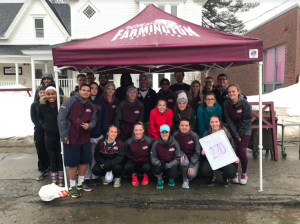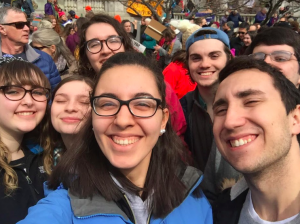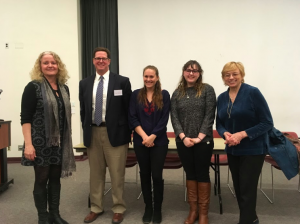
Apr 13, 2018 | News |
By Emily Thibodeau Contributing Writer
UMF’s Track team is looking forward to a great season as they had a strong first meet at Eastern Connecticut State University. Individuals of the team broke school records, personal records, as well as qualifying for the New England championship.
The team has had rough training conditions as they have been forced to practice inside due to the snow. The original time for first meet was rescheduled due to weather so the team was like “horses ready to get out of the gate,” according to head coach Dan Campbell.
Some of the team’s highlights of the first meet include Olivia Ridley’s new personal best that also broke the school’s record for the 5000 meter race with a time of 18 minutes and 37 seconds. Laura Pulito qualified for New Englands in the 800 meter race, while Shane Hathaway and Corey Martin missed the qualifying time for New Englands by just over a second.

The track team engaging in fund raising off the track. (Photo by Cameron Eggerman)
Ethan Solis, a first-year student also broke a school record at the first meet in the 200 meter race. This will be Solis’s fourth year doing track.
“To be honest it’s amazing having that feeling of beating a personal record,” Solis said. “But when it comes to a school record, it’s just an overwhelming experience.”
First-year student Abshir Abukar has been doing track for seven years and feels “pretty confident” about the upcoming season. Abukar got a new personal record in the 400 meter race at the first meet. Abukar said his goal is “to break 50 seconds in the 400 meter race” this season.
The first meet ended with rough conditions when it started to rain during the last events. Solis said, “My shoe came untied at the start of my last race, it took forever to tie because my hands were shivering from the cold.” Abukar wasn’t bothered by the rain, saying, “It was cold but halfway through the race I stopped feeling everything because I was focused on beating the other guy.”
The UMF track team has been part of the North Atlantic Conference (NAC) for the past three years. Campbell has been coaching the team during the past three years and is looking forward to building the team. This year the team has grown to 36 members with lots of promising freshmen.
The team has high hopes for this year, as they believe they have a chance to compete well against other teams. Campbell said as long as there are no injuries or sickness he believes that the Men’s team could place second for the second year, and Women could place third or fourth overall for their conference. Campbell said he is expecting to see stronger individual and relay results this season.
Abukar confidently said, “We’re gonna win NACs.” Solis agreed with Coach Campbell and said, “Our relays have a good chance of going to New Englands. I just hope that I can help my team when it comes to the NAC Championship because that is when it matters the most.”

Apr 13, 2018 | News |
By Olivia White Contributing Writer
UMF students, educators, and politicians showed their support for the Parkland school shooting by participating in marches held in both Farmington and Portland.
Kayla Suzanne, a student teacher at Mt. Blue Elementary, and Vanessa Brown, a student activist, both had the opportunity to be involved with the march in Farmington. Both had nothing but good things to say about the march.
“Overall, there was a positive and peaceful atmosphere,” said Brown. “Everyone wanted to make sure everyone else stayed safe.”

Many UMF students travelled to Portland to join their march. (Photo by Tina Hall)
Suzanne participated in the Farmington March for Our Lives as a speaker, whose speech cried out for help from the government and society to “think about and remember our basic civil rights, which should never get in the way of us feeling safe in our schools, because every child deserves a chance!”
Suzanne says that this part of her speech means a tremendous amount “because of how many people came out to the march from all different generations and backgrounds.”
On the same day as the march in Farmington, Jeffrey Willey, President of the College Democrats, and Eliza Robinson, another student activist, participated in the march held in Portland, Maine. This march encompassed around five to eight thousand participants. These participants ranged from grade school children to college-aged and beyond. Willey described the march as a “lively environment.”
One of the most memorable events during the Portland march was a marine who gave a speech at the end of the march. Protesters cried during the marine’s speech when he used personal experience in the military to explain why he believed there should be a control on guns within the United States. Willey’s major takeaway from his speech was when the marine explained how he has “seen friends die.”
Robinson and Willey both acknowledged the constant chants being sung by students throughout the streets. Willey remembered one chant that rung out throughout the streets, “enough is enough.” Willey hopes these movements will continue to make an impact not only on students, but that they will make an impact on those who have the authority to change legislature.
Willey was surprised to see no one protesting the march. While Portland may not have had protestors, the March for Our Lives in Farmington had many. Brown said, “There were people who were protesting the march, and for the majority of the people who were there, we tried to focus more on the people that were speaking rather than focusing on the people.”
Willey acknowledged that some students may not have been able to participate in these events. Willey suggested that people who want to be involved in political change should call and write to their senators and representatives and vote for those who have a vision for change.
Senator Susan Collins:
(207) 622-8414
68 Sewall Street Room 507
Augusta, Maine 04330
Senator Angus King:
(207) 622-8292
4 Gabriel Drive Suite 3
Augusta, Maine 04330

Apr 13, 2018 | Feature |

Kristen Sarasin, a member of the Performative Writing class, has a monologue and one-act in the Festival of New Works.
By Nicole Pilote Contributing Writer
Students in the Performative Writing for the Stage class have written and created plays that will be performed at the Festival of New Works near the end of April. The festival will feature ten minute monologues and one-act plays.
All of the plays are written and performed by UMF students. Each student has spent many hours writing and editing scripts of their plays, and they will direct their works on stage.
Kristen Sarasin, a Junior double majoring in English and Creative Writing and minoring in Women’s Studies, has a one-act play and a monologue that will both be performed during the festival.
“The Festival of New Works has allowed us to dig deeper into our scripts and constantly revise the piece as a whole,” Sarasin said. “The process is difficult but rewarding; it results in more polished work.”
Students Astra Pierson and Ian Grima, who auditioned in early March for the roles, will be performing the lead roles in Sarasin’s one act. Her play depicts the last moments of a marriage between a couple in the time of their divorce.
“I picked Astra and Ian as characters for this play because they both brought individual differences towards the role of each character,” Sarasin said. “Astra had strength and Ian had the softness that was easily relatable to the characters.”
The course, Performative Writing for the Stage, is a general education class that combines elements of playwriting and staging a show. It allows students to have a closer look into playwriting through writing scripts and developing characters, as well as learning the technical aspects of theatre such as lighting and sound. Jayne Decker, UMF’s theater professor, teaches the class. Students in the class met with Decker individually during workshops to perfect their work.
“I enjoyed writing the script for my one act because it allows room the explore the relationship between two people, to be able to show the honesty in people’s lives,” Sarasin said.
The Festival of New Works will be held on Thursday the 19th and Friday the 20th.
Apr 13, 2018 | News |
By Eryn Finnegan Editor-in-Chief
After months of anticipation and speculation, UMF professors, students and community members gathered in Emery Arts Center to learn which culturally significant works will be taught next school year as the next phase of the New Commons Project begins.
The project was initially met with 155 submissions from 12 counties across the state. From 155, the submissions were narrowed down to 25, and from there to the final 12. The final 12 submissions range from novels to television shows to albums and are meant to showcase cultural works that Farmington and the state of Maine in general finds important and that needs to be taught now.
The final 12 nominations are the American Canoe, Persuasion by Jane Austen, The Simpsons, poetry collection Dirt Road Home by Cheryl Savageau, jazz musician John Coltrane’s album Alabama, street artist Banksy, The Wire, Beethoven’s 6th Symphony, the FEDCO Seed Catalogue, rapper Kendrick Lamar’s album DAMN, James Baldwin’s essay The Fire Next Time, and the novel Inside Out and Back Again by Thanhha Lai.
Kristen Case, a UMF English professor and the head of the New Commons Project, commented that almost every selection had the aim of teaching the audience a lesson. From there, the submissions were narrowed down to two categories: those that teach us lessons such as raising awareness about a political or social issue, and those that teach us values such as love and especially empathy.
“You told us that these works should teach us how to empathize with one another,” Case said as she beamed at the audience. “You told us we should reflect on powerful social critiques, such as James Baldwin’s essay and Kendrick Lamar’s album, acknowledge works that were groundbreaking for their time, such as the canoe, or that they should be personally helpful.”
Astra Pierson, the student representative on the New Commons committee, also commented on some of the works, noting that many works held regional significance as well as personal beauty.
“You told us that we need these works because they teach us about the world, break traditional forms, exercise freedoms, and take risks,” Pierson said. “These nominations provide critiques, speak to this place [Maine] and landscape and people, and help us make it through the hard times.”
Christine Darrohn, another English professor, is optimistic about the works chosen and is thrilled about the broad range of mediums and people represented.
“I’m so excited to see so many different ethnicities and countries and orientations represented!” Darrohn said. “There are so many different pieces and the things you could teach about each of them are endless.”
Prior to the unveiling of the final 12, UMF hosted poet and essayist Lewis Hyde, who spoke “in defense of the cultural commons” and offered his insights into the project, noting that some of the works may run into copyright issues.
Starting in September, The New Commons Project will be taught amongst various entry level courses, as well as its own dedicated class: “Topics in Humanities: The New Commons,” listed as HUM-277H on the mycampus schedule planner under the category “humanities.” According to Case, the methods of teaching these works will range anywhere from writing essays to performing music in concerts based off of the material.
The New Commons Project is made possible by a grant from the Mellon Foundation and the Maine Humanities Council.
To learn more about The New Commons nominations, visit the website at http://newcommons.umf.maine.edu/.

Apr 13, 2018 | News |
By Darby Murnane Contributing Writer
A conference on modern-day human trafficking was recently co-hosted at UMF by The International and Global Studies Program, the Office of Global Education and the Pi Sigma Alpha Political Science Honors Society.
The conference included the screening of the documentary “I Am Jane Doe,” a speech by UMF student and human trafficking survivor Moninda Marube and panel discussion presented by other survivors and advocates.
Marube, a Community Health major, was the genius behind the conception of the conference. Seven years ago, he came to the U.S. from his home in Kenya to run races in hopes of raising money to bring home, where he lived in extreme poverty. However, all of the money he made was taken by a manager who also held Marube’s passport and documents so he could not walk away. Marube ev

The conference aimed to inform people of the dangers and sings of human trafficking. (Photo by Darby Murnane)
entually escaped to Maine, where he is still running and getting a college education.
The conference began with a showing of “I Am Jane Doe,” a film documenting the stories of families who sued Backpage.com, a website where their daughters had been sold into sex trafficking. Following the film was a short panel discussion involving UMF students representing the College Republicans and Democrats, as well as Attorney General Janet Mills and District Attorney Andrew Robinson. A major theme of the evening was imparting the knowledge that the face of human trafficking is not what one might see in movies. Robinson said, “It can happen to anybody’s kid from any kind of neighborhood. And it is happening in our neighborhoods.”
In an interview with Marube, he said “The days are long gone when people are forced to do things. The human exploitation that is going on in the world right now is not like the transatlantic slavery, whereby people were being abducted from their country and being put in chains. Those are very minimal cases. Nowadays it is about manipulation and blackmail.”
Marube defines the human trafficking network as a tree. “You can trim the branches,” he said, “but the roots keep growing.” One of the biggest challenges in combating trafficking is the ability to recognize victims and the ways in which their traffickers ensnare them. “Right now the signs are so hidden,” Marube said.
Janet Mills said after the panel following the documentary that she is pleased this conference is being held. “Public education is key. Parents and families need to know this happening,” Mills said.
Kristen Cloutier, a Secondary Education Social Studies major in the audience, was shocked to learn the scope of the realities of human trafficking.
“I knew what human trafficking was, but I never realized the immense reaches of it,” Cloutier said. “I had never even heard of Backpage before tonight. This has definitely been an eye-opener.”
In an email interview, Dr. Nicole Kellett of the International and Global Studies Program shared her goals for the conference as she too believes in the power of educating people.
“I hope that it raises awareness and incites action,” Kellett said. “You may be able to recognize a situation of trafficking and help. You may find yourself in a situation of being trafficked and know about resources to get out. You may be better informed on how to evaluate policies to be a more educated voter to support legislation that helps prevent trafficking.”
Marube shared an important message to impart when reflecting on it all; “I think each of you have a life, and each of you have a purpose in life. There are two most important days in your life: the day you were born and the day you know why.”



